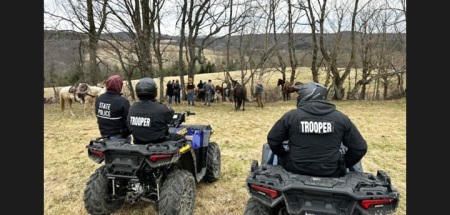Outdoor Chenango: It's Almost Over
Published:
December 14th, 2022
By:
Eric Davis

The late archery and muzzleloader season ends in less than a week on Tuesday the 20. Then it reopens for the “Holiday Hunt” on December 26 and runs through New Year’s Eve for the second year. Once that season ends, that is it for deer hunting until October of next year. That 10-month period can be rough on hunting gear if it is not properly taken care of and stored.
Take the time to wash and dry all your hunting clothing. This gets any sweat, oils, and blood out of the clothing that could result in foul odors or cause stains if left untreated. Store your clothes in an airtight container or at least in a location where the clothing isn’t covered in furnace exhaust fumes or where insects can’t get to it.
The same goes for footwear. Make sure it is completely dry on the inside and outside before storing. If you use your boots or clothes for other activities such as ice fishing or snow removal, just take good care of them by washing them regularly. Calls and other gear should also be stored in airtight containers. Anything that runs off from batteries should have the batteries removed to prevent the batteries from leaking.
Cleaning your firearm is a great way to protect your investment before storing it. The residue in the barrel from burnt powder is corrosive and can lead to rusting and pitting that impacts the accuracy of the firearm. Similarly, not cleaning a firearm after using it in the rain or snow can lead to surface rust developing. I really like using a bore snake to clean the inside of my firearms’ barrels. Very rarely does a barrel require more than 2 passes with the snake to fully clean it. After this, I run an oiled patch down the barrel followed by a dry patch to soak up any excess. I like to use oil on the outside of the barrel and wipe it clean with a cotton rag. Avoid getting oil on any wood stocks or forearms as this can cause the wood to swell, leading to cracking.
Muzzleloaders may require extra cleaning such as using a cleaning solvent to clean the breech plug or solvent-soaked patches in the barrel. Along with the firearm, ammunition storage is important. Rusty casings can jam in a firearm or primers can go bad causing the round not to fire. Take any ammunition you carried out and dry it with a towel before putting it away. I like to store my extra black powder containers inside of Ziploc-style bag to keep humid air out during the summer months.
Have you been thinking about how you want to move a stand location before next season? Or have you left your stand up for a couple years? It might be time to take your stand down before it faces another long winter in the woods. As always, wear a safety harness when working on treestands and work with a buddy whenever possible.
Make sure you remove any gear hooks you have installed first before you take down the stand (I’ve made the mistake of taking the stand down then looking up and seeing my bow hook still in the tree). Bring you stand to a good location to store it until the summer. You can make any tweaks to the stand such as tightening a loose bolt or changing the seat out after the squirrels have chewed the old seat. Ground blinds should be taken down as soon as possible because heavy snow and high winds can cause a lot of damage to ground blinds. If the blind has snow and ice on it, bring it someplace where you can let the blind thaw out and dry before putting it away for a few months.
While it is advantageous to leave up your trail cameras for a few weeks to see if you can get pictures of any bucks that survived through the hunting seasons, leaving cameras up all winter might not be the best idea. In extreme cold, batteries don’t last very long so you may only get a few pictures before the camera stops working. Also, bucks will be shedding their antlers soon so it will be difficult to identify bucks from does in the pictures. Bring your cameras inside and remove the memory card and batteries. Then put the camera somewhere where it can dry out for a few days before putting it away until the spring or summer.
Author: Eric Davis - More From This Author
Comments








